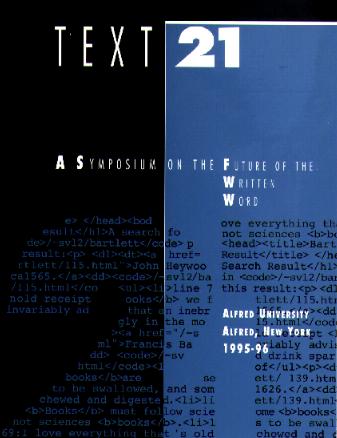 |
|||||
 |
TEXT 21
|
Over the past two decades, the computer has transformed the written word. Writing by e-mail has become more common than writing letters. The growth of electronic publishing has challenged the primacy of the printed word. And what was once stored in libraries and protected by copyright is now being carried on the information superhighway.
Text 21 has been designed to examine the impact of the new technology on the arts and humanities. Through a sequence of four weekend conferences, we will probe the ethical, legal, political, and philosophical issues attendant to the digital revolution. Those issues include privacy, copyright, censorship, the aesthetics of the book, and the influence of digital technology on our perceptions of the real.
Free and open to the public, this symposium welcomes technophobes and technophiles alike. Set in the quiet environs of Alfred University in upstate New York, Text 21 will provide a forum where the effects of high technology on the ways we read, write, think, and communicate can be thoughtfully explored. We invite your participation and support.
The Fate of the Book
Will books become obsolete in the twenty-first century? As text moves from paper to the computer, what are the perils and possibilities?
- Sven Birkerts
- Keynote Address
- Friday, September 15
- 8 p.m., Holmes Auditorium, Harder Hall
A distinguished literary critic, Sven Birkerts received the Citation for Excellence in Reviewing from the National Book Critics Circle in 1985 and a Guggenheim Fellowship in 1994. His most recent book is the Gutenburg Elegies: The Fate of Reading in an Electronic Age.
-
Robert Stein - Saturday, September 16
- 9:30 a.m., Holmes Auditorium, Harder Hall
In 1984, Robert Stein co-founded the Voyager Company, a multimedia publishing house. Voyager's catalogue of CD-ROM and laser disc titles, ranging from the symphonies of Beethoven to the works of Laurie Anderson, continues to expand the boundaries of electronic publishing.
- Patricia Battin
- Saturday, September 16
- 11:00 a.m., Holmes Auditorium, Harder Hall
Recently hired by Emary University to develop a prototype for a virtual library, Patricia Battin is a former Director of Library Services at Columbia University and a past president of the Commission on Preservation and Access in Washington, D.C.
- Panel Discussion
- 1 p.m. Saturday, September 16
- Holmes Auditorium, Harder Hall
Text and Image
As media merge, the lines between text and image blur. How will new developments in electronic imaging change the ways we create, store, and study works of art?
- Johanna Drucker
- Keynote Address
- 8 p.m., Friday, October 27
- Holmes Auditorium, Harder Hall
A writer, publisher, and scholar, Johanna Drucker studies the relationship of text and image in the production of visual meaning. She is an associate Professor of Contemporary Art and Theory at Yale University.
- Joseph Nechvatal
- 9:30 a.m. Saturday, October 28
- Holmes Auditorium, Harder Hall
With robotic arms and computer viruses, Joseph Nechvatal creates dense, layered images. His most recent work, the Computer Virus Project, brought him international attention in the art world.
- Chris Burnett
- 11 a.m., Saturday, October 28
- Holmes Auditorium, Harder Hall
Chris Burnett's books and interactive works have been shown internationally since 1987. They address subjects as diverse as myths of the future, the animation industry and Las Vegas.
- Interactive Presentations
- 1 p.m., Saturday, October 28
- Holmes Auditorium, Harder Hall
Digital Conversations
What are the implications of electronic networks for research, writing, publishing, and public education? Who will own and control the Internet?
- Jerome McGann
- Keynote Address
- 8 p.m., Friday, March 15
- Roon Lecture Hall, Science Center
The Stewart Bryan Professor of English at the University of Virginia, Jerome McGann develops electronic versions of literary texts. He is the creator of a World Wide Web site which archives the writings and pictures of Dante Gabriel Rossetti. He also established the Hypermedia Archive, which studies Pre-Raphaelite art.
- Charles McClure
- 9:30 a.m., Saturday, March 16
- Holmes Auditorium, Harder Hall
Charles McClure is Distinguished Professor at the School of Information Studies at Syracuse University. The author of Libraries and the Internet, he founded the journal Internet Research: Electronic Networking Applications and Policy. In 1993, he was named "Distinguished Researcher" by the National Commission on Libraries and Information Science.
- Laura Fillmore
- 11:00 a.m., Saturday, March 16
- Holmes Auditorium, Harder Hall
Laura Fillmore is President of the Online Bookstore in Rockport, Massachusetts. Responsible for publishing works by authors as diverse as Nelson Mandela and Ted Nelson, she is an expert on intellectual property rights and commercial aspects of the Internet.
- Panel Discussion
- 1 p.m., Saturday, March 16
- Holmes Auditorium, Harder Hall
The Future of the Written Word
As the written word moves from paper to computer, how will the shift to electronic text affect our language and perceptions?
- Michael Heim
- Keynote Address
- 8 p.m., Friday, April 12
- Holmes Auditorium, Harder Hall
Michael Heim applies philosophical methods to an understanding of technology. His seminal books Electronic Language and The Metaphysics of Virtual Reality were among the first to question the effects of computers on language, life, and culture.
- Paul Levinson
- 9:30 a.m., Saturday, April 13
- Roon Lecture Hall, Science Center
Professor of Communications Research at Farleigh Dickinson University, Paul Levinson is President of the not-for-profit Connected Educated, Inc. His company has offered a program of courses since 1987, using computer teleconferencing for granduate and undergraduate education.
- Laurie McRobert
- 11 a.m., Saturday, April 13
- Roon Lecture Hall, Science Center
Laurie McRobert brings her philosophical training to bear on the broader issues of cyberspace. Her recent work has addressed the changes we can expect in the written and spoken word. She teaches at the Thomas More Institute in Montreal.
- Panel Discussion
- 1 p.m., Saturday, April 13
- Roon Lecture Hall, Science Center